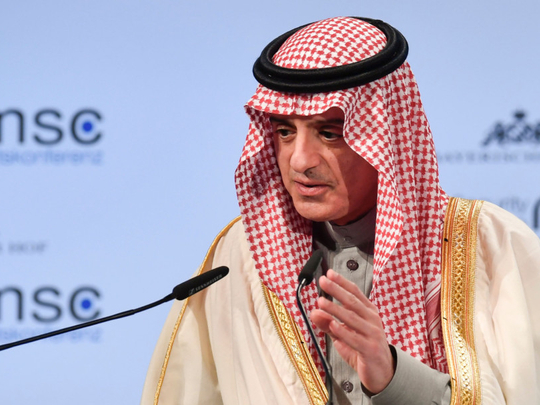
Dubai: Saudi Arabia’s Foreign Minister Adel Al Jubeir has reitterated that the world powers’ current nuclear agreement with Iran was not enough to modify its troublesome behaviour.
“We have to work together to force Iran to refrain from getting involved in the internal affairs of the region’s states,” he said in a speech before the European Parliament in Brussels on Thursday.
“We say to Iran enough, the (1979) revolution is over,” he added.
Al Jubeir added that the Iran-backed Al Houthi militia have caused a famine in Yemen and planted mines everywhere, blocking food and water from reaching cities and rural areas under Al Houthi control.
He also reaffirmed that the militia is receiving ballistic missiles from Iran.
Earlier this week Sudi Arabia welcomed a draft United Nations resolution offered by Britain, the United States and France that would condemn Iran for failing to stop its ballistic missiles from falling into the hands of Yemen’s Al Houthi group.
Al Jubeir said that the measure, if passed, would help hold Iran accountable for what he described as its “exports of ballistic missiles” to the Iran-backed Al Houthi militia, and “radical and aggressive” behaviour in the region, including support for terrorist groups.
A Saudi-led coalition intervened in Yemen in 2015, backing the internationally-recognised government, fighting Iran-allied Al Houthi militants.
The draft text to renew UN sanctions on Yemen for another year would also allow the 15-member council to impose targeted sanctions for “any activity related to the use of ballistic missiles in Yemen”.
Britain drafted the resolution in consultation with the US and France before giving it to the full council, diplomats said.
“In order to ensure that Iran comports itself with international law, we must have firmer positions with regards to ballistic missiles and Iran’s support for terrorism,” Al Jubeir said in an interview during the annual Munich Security Conference earlier this week.
“Iran must be held accountable.”
He said Iranian missiles were regularly used by Al Houthis “to target civilians in Yemen as well as inside Saudi Arabia.”
Al Jubeir also called for changes to two aspects of the 2015 nuclear accord with Iran — cancellation of a so-called sunset provision, and expanded inspections to include non-declared and military sites.
The draft UN resolution, which needs to be adopted by February 26, is likely to face resistance from Russia.
A resolution needs nine votes in favour and no vetoes by Russia, China, the United States, France or Britain to pass.
In Brussels, Al Jubeir remained optimistic about a political solution.
“Al Houthis will resort to negotiations at some point as it is the only solution,” he said.
Al Jubeir said that Saudi Arabia has welcomed more than one million refugees, as well as provide them with jobs.
He also said that the kingdom is working to support Iraq in every way to guarantee that Daesh does not return to the country. He expressed his worry that the extremist group will, however, expand along the Libyan coast.
Al Jubeir also spoke about relations with Qatar, saying that they may improve, provided that Qatar stops funding and supporting terrorism.












